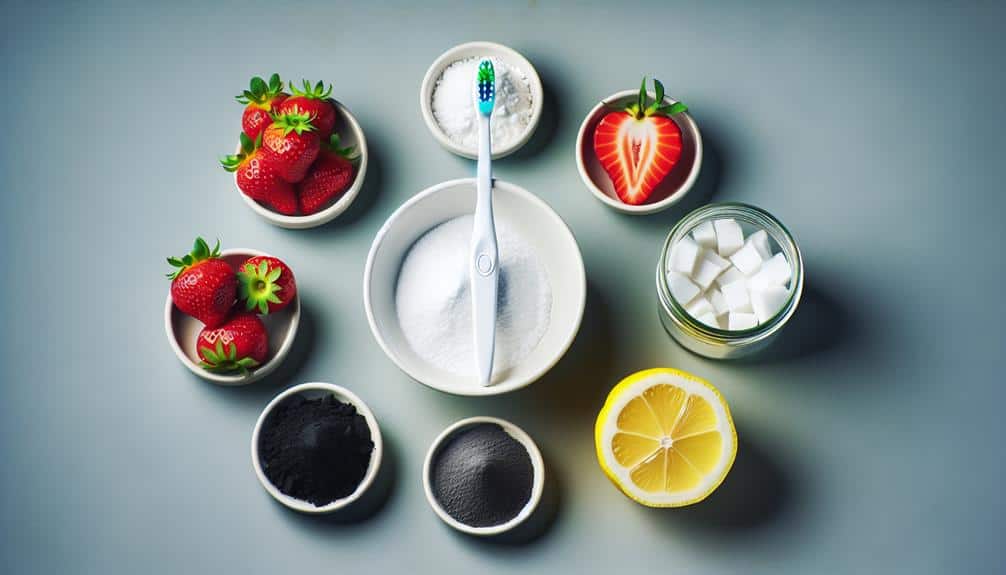Brighten your smile easily with these simple DIY teeth whitening techniques. Try mixing baking soda with hydrogen peroxide to remove surface stains, remembering not to overuse to protect your enamel. Oil pulling using coconut oil not only fights bacteria but also supports gum health. Activated charcoal toothpaste is a natural option to help remove stains caused by coffee or wine. You can also create a paste using strawberries and baking soda or turmeric and coconut oil for a gentler but effective whitening method. These methods offer a natural and cost-effective way to enhance your oral health and achieve a brighter smile.
Key Points
- Baking Soda and Hydrogen Peroxide: Removes surface stains but limit use to prevent enamel erosion.
- Oil Pulling With Coconut Oil: Combats bacteria, reduces cavities risk, and supports oral health.
- Activated Charcoal Toothpaste: Natural whitening, detoxifies mouth, use moderately to avoid enamel erosion.
- Strawberry and Baking Soda Paste: Cost-effective, gentle on enamel, removes stains effectively.
- Turmeric and Coconut Oil Paste: Natural abrasive, promotes gum health, gentle yet effective whitening.
Baking Soda and Hydrogen Peroxide
For a simple yet effective way to whiten your teeth at home, consider combining baking soda with hydrogen peroxide. This DIY teeth whitening technique is popular due to its ability to remove surface stains and brighten your smile. However, it's essential to use this method cautiously, as both ingredients can be abrasive and may lead to enamel erosion if used excessively.
Baking soda, also known as sodium bicarbonate, acts as a mild abrasive that helps scrub away stains on the surface of your teeth. When combined with hydrogen peroxide, a bleaching agent, it creates a powerful yet gentle whitening solution. It's important to note that using this mixture too frequently or leaving it on for extended periods can cause sensitivity and harm your enamel.
To protect your oral health while using this technique, limit the frequency of application to once or twice a week. Additionally, avoid consuming acidic fruits or beverages immediately after whitening, as they can contribute to enamel erosion. Remember to brush gently and follow up with a fluoride toothpaste to maintain healthy teeth and gums.
Oil Pulling With Coconut Oil
To enhance your oral hygiene routine, consider incorporating oil pulling with coconut oil as a natural method for promoting dental health and potentially whitening your teeth. Oil pulling has been used for centuries as an Ayurvedic practice to improve oral health. When done with coconut oil, which has antimicrobial properties, the benefits are even greater. Here are some key points to keep in mind:
- Oral Hygiene Benefits: Oil pulling helps to remove harmful bacteria, plaque, and toxins from your mouth, leading to fresher breath and healthier gums.
- Coconut Oil's Antimicrobial Properties: Coconut oil contains lauric acid, which has antimicrobial properties that can help combat bacteria in the mouth.
- Promotes Mouth Health: By swishing coconut oil in your mouth, you can potentially reduce the risk of cavities and gingivitis.
- Potential Teeth Whitening: Over time, oil pulling with coconut oil may help whiten your teeth by reducing surface stains and promoting overall oral health.
Incorporating oil pulling with coconut oil into your daily routine can be a simple yet effective way to support your oral health.
Activated Charcoal Toothpaste
Consider trying activated charcoal toothpaste as a natural alternative for enhancing teeth whitening and oral hygiene. Charcoal powder, the main ingredient in these toothpaste products, works effectively to remove surface stains on teeth caused by coffee, tea, or wine. Its mildly abrasive nature assists in scrubbing away these stains without causing damage to the enamel. Activated charcoal is also known for its ability to bind to toxins and chemicals, aiding in overall mouth detoxification.
These toothpaste options are part of the trend towards natural remedies for oral care, appealing to those seeking a more holistic approach to dental hygiene. While activated charcoal toothpaste can help whiten teeth and freshen breath, it's important to use it in moderation due to its abrasive properties. Start by using it once or twice a week to prevent any enamel erosion. Remember to consult with your dentist before incorporating any new dental products into your routine to make sure they align with your oral health needs.
Strawberry and Baking Soda Paste
Enhance your teeth whitening efforts with a homemade paste using strawberries and baking soda, a natural and effective method for brightening your smile. The strawberry treatment combined with baking soda can help remove surface stains and plaque, giving your teeth a cleaner appearance.
- Effective Whitening: The natural acids in strawberries help break down stains on the teeth, while the abrasive nature of baking soda aids in scrubbing them away.
- Antioxidant Boost: Strawberries are rich in antioxidants that can benefit your oral health by reducing inflammation and fighting bacteria.
- Gentle on Enamel: This DIY paste is gentler on your enamel compared to some commercial whitening products, providing a safer option for brightening your smile.
- Affordable and Accessible: Both strawberries and baking soda are commonly found in households, making this whitening treatment a cost-effective solution.
Try this natural remedy for teeth whitening and enjoy a brighter smile without the harsh chemicals found in some commercial products.
Turmeric and Coconut Oil Paste
For a natural approach to teeth whitening, combine turmeric and coconut oil to create a potent paste that can help brighten your smile effectively. Turmeric, known for its anti-inflammatory and antimicrobial properties, offers numerous benefits beyond just adding flavor to your dishes. When used in teeth whitening, turmeric acts as a natural abrasive that helps remove surface stains and plaque buildup, revealing a brighter smile. Additionally, turmeric contains curcumin, a compound that has been shown to have antioxidant properties, further contributing to oral health.
Coconut oil, on the other hand, is widely recognized for its versatile uses, including its benefits in oral care. When combined with turmeric, coconut oil helps create a paste that not only aids in whitening teeth but also promotes gum health due to its antimicrobial properties. The oil acts as a carrier for turmeric, ensuring that its beneficial properties can effectively work on your teeth. Overall, this turmeric and coconut oil paste provides a natural and holistic approach to teeth whitening that's gentle yet effective.
Frequently Asked Questions
Are There Any Potential Side Effects or Risks Associated With Using These DIY Teeth Whitening Techniques?
When using DIY teeth whitening techniques, potential risks include tooth sensitivity and gum irritation. To minimize these, follow safety precautions like limiting frequency and duration. Despite benefits, consult with a dentist for personalized advice on effectiveness.
How Often Should These Methods Be Used to See Noticeable Results?
Regularity is key for radiant smiles. Consistent application of DIY methods yields noticeable results. Aim for using these techniques 2-3 times weekly. Over time, persistence pays off with brighter, whiter teeth for a lasting impact.
Can These Techniques Be Used by Individuals With Sensitive Teeth or Existing Dental Conditions?
For sensitive teeth or existing dental conditions, it's important to focus on sensitivity management. Consider alternative treatments and natural remedies that are gentler. Make sure you consult a dentist to address concerns effectively and safely.
Are There Any Natural Alternatives to These DIY Methods That Can Be Used for Teeth Whitening?
Looking for natural alternatives to brighten your smile? Consider ingredients like baking soda, activated charcoal, or oil pulling. While DIY methods can work, professional treatments offer quicker and more lasting results, especially for tough stains.
How Long Do the Effects of These DIY Teeth Whitening Techniques Typically Last Before Needing to Be Repeated?
For long term effectiveness, DIY teeth whitening techniques typically last a few months. Maintenance is key; touch up frequency varies based on habits and products used. Reapplication timing can range from every few weeks to a few months.



